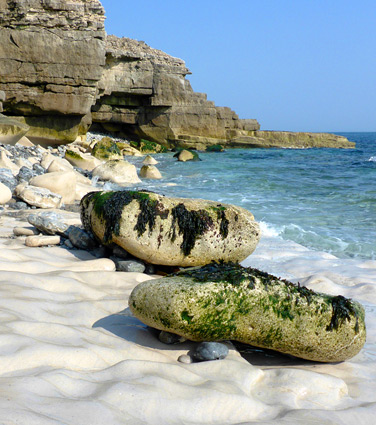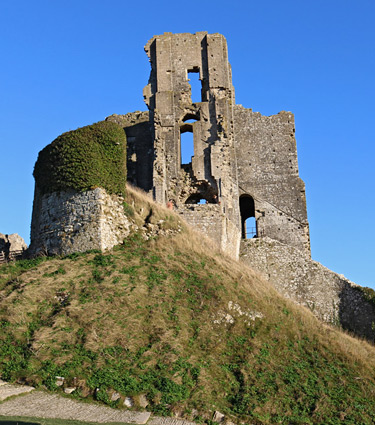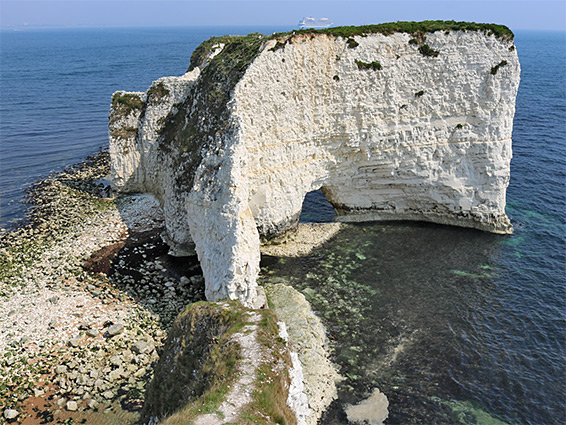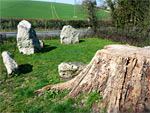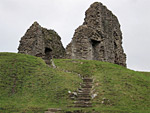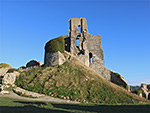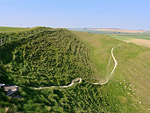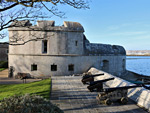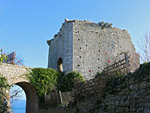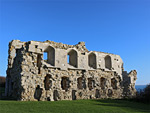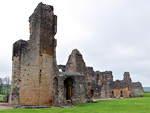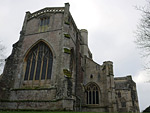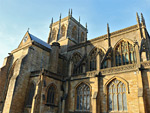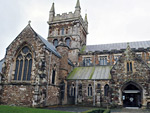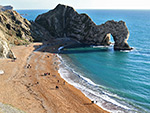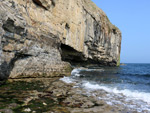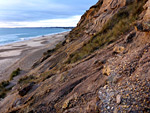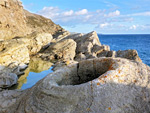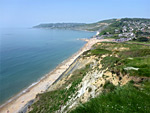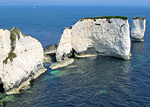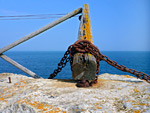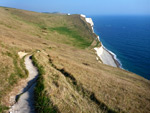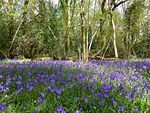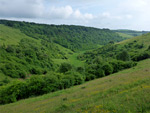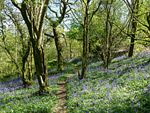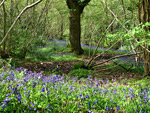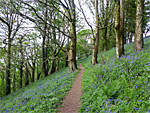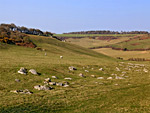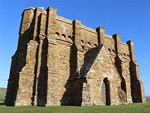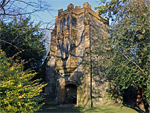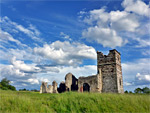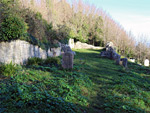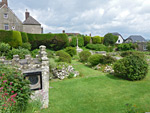The most spectacular landscapes in Dorset are found along the coast which, including the unitary authority areas of Poole and Bournemouth, extends for 55 miles west to east, from Lyme Regis bordering the East Devon Area of Outstanding Natural Beauty, to Christchurch, close to New Forest National Park. Most forms part of the Jurassic Coast, famous for its exposed, fossil-bearing strata, which are eroded into a great variety of formations. Within Dorset, the best stretches of coastline are from Lyme Regis to Seatown, and on to West Bay (8 miles) - as this has beaches beneath a line of high cliffs, and some rocky promontories - and especially, the 30 miles from Weymouth Bay to Studland, the Purbeck Heritage Coast; contained within this area are numerous coves, sea stacks, peninsulas, arches and reefs, including such famous locations as Old Harry Rocks, Lulworth Cove and Durdle Door. In between these two stretches the land is low and flat, bordered by long, little-changing sandy beaches, and so is generally less scenic, apart from the southernmost point at the Isle of Portland, a sizeable, semi-detached limestone headland.
Away from the coast, most of Dorset is hilly, and the county is crossed by several broad ranges of chalk uplands, forming the Dorset Downs and part of Cranborne Chase (which extends into Hampshire and Wiltshire), plus a narrower range in the southeast, across the Isle of Purbeck. Between the hills are broad valleys, sprinkled with patches of woodland, all part of a predominantly rural landscape that has few large towns or major roads, so travel across the county can be rather slow.
Although lacking any cathedrals, Dorset has plenty of historic churches, some dating from Saxon or early Norman times. Sherborne Abbey and Christchurch Priory are amongst the finest of these. There are several ruined abbeys and chapels across the county, though none is particularly large. Prehistoric relics are limited to earthworks, burial mounds and a few minor stone circles. By far the most spectacular castle in Dorset is at Corfe, perched on top of a steep-sided hill; other notable examples are in Christchurch and Sherborne.
Forty four percent of the county is within the Dorset Area of Outstanding Natural Beauty.
Away from the coast, most of Dorset is hilly, and the county is crossed by several broad ranges of chalk uplands, forming the Dorset Downs and part of Cranborne Chase (which extends into Hampshire and Wiltshire), plus a narrower range in the southeast, across the Isle of Purbeck. Between the hills are broad valleys, sprinkled with patches of woodland, all part of a predominantly rural landscape that has few large towns or major roads, so travel across the county can be rather slow.
Although lacking any cathedrals, Dorset has plenty of historic churches, some dating from Saxon or early Norman times. Sherborne Abbey and Christchurch Priory are amongst the finest of these. There are several ruined abbeys and chapels across the county, though none is particularly large. Prehistoric relics are limited to earthworks, burial mounds and a few minor stone circles. By far the most spectacular castle in Dorset is at Corfe, perched on top of a steep-sided hill; other notable examples are in Christchurch and Sherborne.
Forty four percent of the county is within the Dorset Area of Outstanding Natural Beauty.
Ancient SitesThe Nine Stones Late Neolithic circle of nine sarsen stones, two large and seven small, in a shallow valley adjacent to patch of woodland Rating: ★★★★★ |
CastlesChristchurch Castle Small ruins of a Norman keep, adjacent to a well-preserved riverside house from the same period Rating: ★★★★★ |
| Corfe Castle Large, ruined castle with a spectacular location on top of a steep-sided hill; construction started in the 11th century Rating: ★★★★★ |
| Maiden Castle The largest hillfort in the country - half a mile across, enclosed by ramparts and ditches, on a chalk ridge south of Dorchester Rating: ★★★★★ |
| Portland Castle Well preserved coastal fort built by Henry VIII, overlooking Portland Harbour; gun block, residential building and gardens Rating: ★★★★★ |
| Rufus Castle Minor ruins on a cliff edge, overlooking the coast, on the east side of the Isle of Portland Rating: ★★★★★ |
| Sandsfoot Castle Ruins of a small shoreline fort beside Portland Harbour, built in 1542 by Henry VIII; also known as Weymouth Castle Rating: ★★★★★ |
| Sherborne Old Castle Atmospheric ruins of a large, 12th century fortification surrounded by lawns and woodland, beside a late 16th century castellated mansion Rating: ★★★★★ |
ChurchesChristchurch Priory The longest parish church in England, built in the 12th century, and relatively unaltered since the Reformation Rating: ★★★★★ |
| Sherborne Abbey Ancient parish church with with spectacular medieval architecture; formerly a Saxon cathedral and a Catholic abbey Rating: ★★★★★ |
| Wimborne Minster Fine Norman church with some Saxon components, originally part of a monastery; includes a vaulted crypt, a 14th century astronomical clock and a 17th century chained library Rating: ★★★★★ |
CoastlineDurdle Door and Lulworth Cove Sea arch and a circular cove, part of a varied section of the coast that also has headlands, sandy beaches, chalk cliffs and other eroded formations Rating: ★★★★★ |
| Durlston Head to Seacombe Cliff-bound section of the Jurassic Coast on the Studland Peninsula, including Anvil Point, Dancing Ledge and Headbury Quarry Rating: ★★★★★ |
| Hengistbury Head Headland centred on a hill of colourful sedimentary rock; also has wetlands, dunes, heath, sandy beaches and saltmarsh Rating: ★★★★★ |
| Lulworth Cove to Mupe Bay Short section of the Jurassic Coast, including sea stacks at Mupe Rocks and Bacon Hole, and remains of ancient trees at the Fossil Forest Rating: ★★★★★ |
| Lyme Regis to Seatown High cliffs, wildflower meadows and pebble beaches along five miles of the Jurassic Coast, including Charmouth, Stonebarrow Hill and Golden Cap Rating: ★★★★★ |
| Old Harry Rocks Inaccessible chalk stacks below vertical cliffs, with more spires nearby (The Pinnacles), and the high ground of Ballard Down Rating: ★★★★★ |
| Portland Bill The southernmost tip of the Isle of Portland; flat land ringed by low cliffs of limestone and chert, formerly quarried Rating: ★★★★★ |
| Ringstead Bay to Bat's Head Three mile section of the coast, lined by high chalk slopes with narrow beaches below; includes the promontory of White Nothe Rating: ★★★★★ |
Nature ReservesBracketts Coppice Over 100 acres of ancient woodland, plantations, pasture and rough grassland, centred on the shallow valley of a fast-flowing stream Rating: ★★★★★ |
| Fontmell Down Chalk downland nature reserve, part of Cranborne Chase; a mix of woodland, scrub, meadows and steep, grassy slopes Rating: ★★★★★ |
| Hendover Coppice Ancient woodland across a steep, northeast-facing slope, with particularly dense bluebells in the spring Rating: ★★★★★ |
| Hibbitts Woods Ancient woodland on gently sloping ground crossed by a few tiny streams, plus a small wildflower meadow Rating: ★★★★★ |
| Holway Woods Ancient woodland across the steep, west-facing slopes of a hill north of Sherborne Rating: ★★★★★ |
| Townsend Limestone grassland with sea views, formerly a quarry, south of Swanage; home to a range of wildflowers including the early spider orchid Rating: ★★★★★ |
| Valley of Stones Chalk downland with grassy slopes and dry valleys, one containing a train of ancient sarsen stones Rating: ★★★★★ |
Ruined Abbeys, and other old religious buildingsAbbotsbury Abbey Relics from a once large monastery near the coast; a wall fragment, a tithe barn, church foundations and the detached St Catherine's Chapel Rating: ★★★★★ |
| Cerne Abbey Limited remains of a Benedictine monastery; a porch (once the entrance to a great hall), a guest house and a tithe barn Rating: ★★★★★ |
| Knowlton Church and Earthworks Isolated, ruined, partly Norman church within the circular, grassy embankment from a Neolithic henge Rating: ★★★★★ |
| St Andrew's Church Overgrown ruins of a 15th century church, on the Isle of Portland, in use until the 1750 when it was abandoned because of nearby landslips Rating: ★★★★★ |
| Shaftesbury Abbey Relics from an ancient abbey (founded 888), mostly low foundations, now incorporated into a garden, accompanied by a museum Rating: ★★★★★ |
